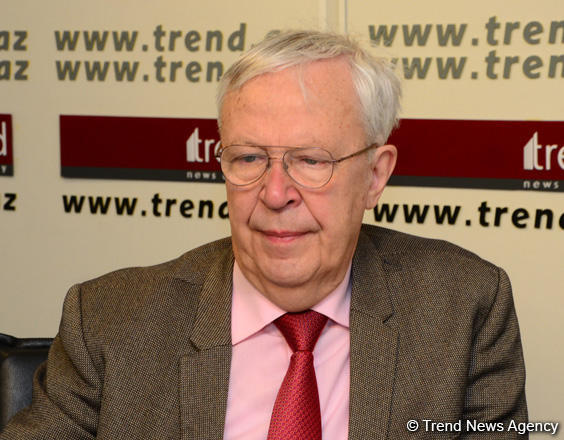Baku, Azerbaijan, April 10
By Matanat Nasibova – Trend:
Azerbaijan is an oasis of stability in the South Caucasus, Stanislav Chernyavsky, director of the Center for Post-Soviet Studies at Moscow State Institute of International Relations, said.
Chernyavsky made the remarks in Baku during a round table meeting dedicated to “Security Problems of the South Caucasus and the Caspian region countries” in the press center of Trend News Agency.
"Three years ago, hostilities resumed in the Nagorno-Karabakh region in April, which were suspended thanks to Russian President Vladimir Putin’s personal participation,” he said. “As a result of this step, Russia played a positive role in preserving the regional security. The sides agreed to create some tools to establish operational communication with the corresponding structures under Putin’s mediation.”
“We think that the mechanisms for establishing operational communication will serve to strengthen trust between the sides, allow them to prevent the risks of uncontrolled turning of some incidents on the line of contact into big clashes,” Chernyavsky said. “We consider this as a positive step in resolving the Armenia-Azerbaijan Nagorno-Karabakh conflict."
“After the protracted transformation of power in Armenia related to the transition to a parliamentary form of government, the negotiation process between Baku and Yerevan began almost from the very beginning,” he said.
"In my opinion, there is a certain positive thing,” Chernyavsky said. “The meeting of the leaders of the two countries in Vienna in March 2019 was held in a constructive atmosphere and it is important that they reaffirmed the need to strengthen and improve the direct communication mechanism and agreed to develop the issues in the humanitarian sphere.”
“The fact that the regular contacts of the leaders of Armenia and Azerbaijan with the participation of the Russian side have intensified shows that there is a certain road map in the Moscow-Baku-Yerevan triangle,” he said. “I am far from thinking that the conflict will be resolved tomorrow and forever. Nevertheless, we see certain progress in this direction."
The event participants discussed Russian-Azerbaijani cooperation in the context of new challenges for the Caspian region, the development of North-South, East-West transport corridor systems as a condition for ensuring security of the Caspian region.
They also discussed signing of the “Constitution of the Caspian Sea” in the context of ensuring regional security in the South Caucasus, regional conflicts and security in the South Caucasus, the fight against terrorism in Azerbaijan, the deepening of economic ties between Azerbaijan and Russia in the light of the formation of a new technology structure in the global economy and economic security, as well as intensification of regional integration and the coordination of the actions of the Eurasian countries in removing tensions and preventing new challenges, the problem of mutual understanding of the North and South Caucasus as a common security system for border states.
From the Azerbaijani side, Azerbaijani MP Rasim Musabayov, head of the Expert Council of the Baku Network, Ph.D. Elkhan Alasgarov, moderator and expert Gulnara Mammadzade, editor-in-chief of the Sputnik-Azerbaijan news agency Ilgar Valizade, professor of Azerbaijan University of Economics Elshad Mammadov, senior adviser of the Baku International Multiculturalism Center Tofiq Abbasov, national security expert, doctor of law Professor Kamil Salimov took part in the meeting.
Stanislav Chernyavsky, director of the Center for Post-Soviet Studies at Moscow State Institute of International Relations, Konstantin Kurylev, director of the Center for Studies of Post-Soviet Countries and Leonid Gusev, senior researcher at the Moscow State Institute of International Relations of the Russian Foreign Ministry participated from the Russian side.
---
Follow the author on Twitter: @MatanatNasibova






